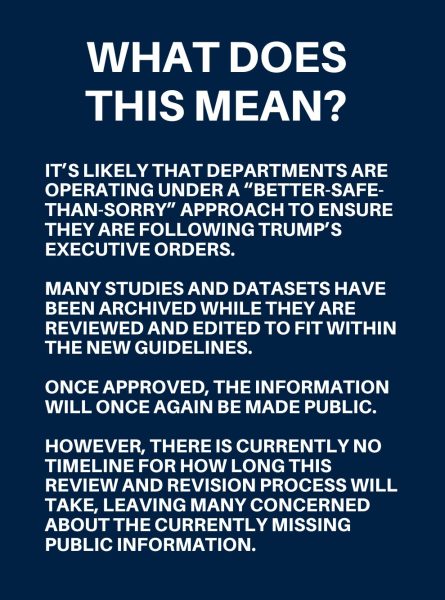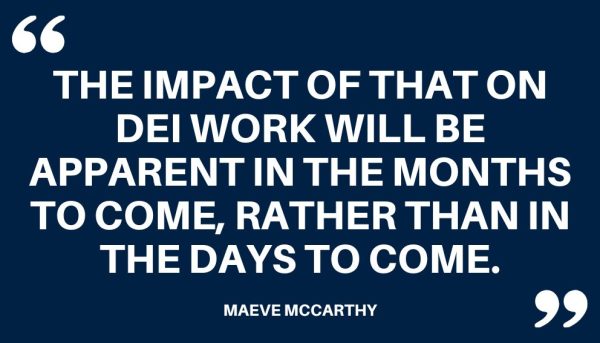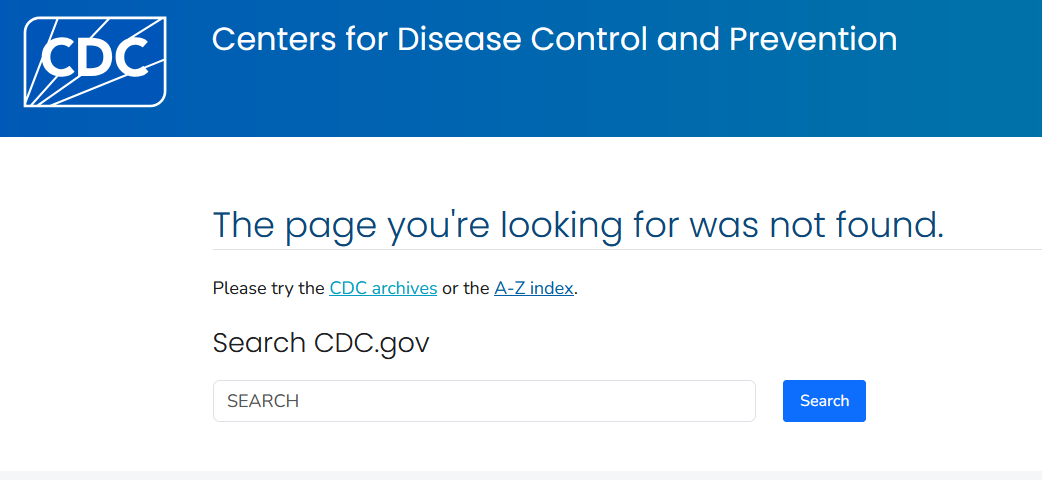A Murray State federal grant-funded program, which researches gender inequity among faculty, faces uncertainty following Trump’s executive orders regarding federal grant funding.
What’s happening on a national level?
On Jan. 20, President Donald Trump issued his executive order Defending Women from Gender Ideology Extremism and Restoring Biological Truth to the Federal Government. The order outlines mandatory actions that U.S. departments must take to adhere to Trump’s directive. Section 3.g of the executive order reads:
“Federal funds shall not be used to promote gender ideology. Each agency shall assess grant conditions and grantee preferences and ensure grant funds do not promote gender ideology.”
On Jan. 29, Charles Ezekk, acting director for the U.S. Office of Personnel Management, sent a memorandum to all heads and acting heads of federal departments and agencies entitled “Initial Guidance Regarding President Trump’s Executive Order Defending Women.” The memorandum included many mandatory steps for departments to take to ensure they are complying with section 3.g, including section d, which reads:
“To take down all outward facing media (websites, social media accounts, etc.) that inculcate or promote gender ideology.”
Publicly-funded scientific departments and nonprofits across the country scrambled to complete the 11 mandatory steps by the 5 p.m. deadline on Jan. 31. The result was countless research websites temporarily going down as administrators made reviews and edits.
According to NPR, trying to access any part of the Census.gov website resulted in an error message for a time on Jan. 31. Public data and reports from various research groups that were temporarily unavailable include the CDC’s HIV surveillance data and the CDC’s Youth Risk Survey.
“The removal of HIV- and LGBTQ-related resources from the websites of the Centers for Disease Control and Prevention and other health agencies is deeply concerning and creates a dangerous gap in scientific information and data to monitor and respond to disease outbreaks,” the Infectious Disease Society of America (IDSA) said in a statement. “Access to this information is crucial for infectious diseases and HIV health care professionals … Timely and accurate information from the CDC guides clinical practice and policies, which are essential for controlling infections and safeguarding health.”
One of the federal agencies affected was the National Science Foundation (NSF), one of the top research funders in the U.S. with an annual budget of about $10 billion. NSF investments account for about 25% of federal support given to American colleges and universities for research.
NSF grants are given to research projects that both advance scientific study and have broader impacts on society. Many of these impacts may be considered overlapping with Diversity, Equity and Inclusion (DEI) topics, which would put them at odds with Trump’s executive order.
“According to an internal document, NSF grants that are flagged for ‘further action’ because they don’t comply with the executive orders could be subject to a range of additional steps, including modification to be in compliance or being terminated in part or whole,” according to a recent Washington Post article.
According to the Washington Post, part of this review process involves using keywords to factor out studies that would not be easily approved under Trump’s executive order. Among others, the keywords include: advocacy, barrier, biases, diversity, equity, female, gender, inequities, male dominated, minority, underrepresented and women.
On Feb. 4, Susan Margulies, NSF assistant director, said the NSF anticipates laying off up to half of its staff within the next two months. An anonymous NSF official told writers from Politico that significant cuts to the NSF would “gut the intellectual center of U.S. leadership in science and technology.”
It is currently unclear how layoffs like this will affect the timeline of getting archived and unavailable studies approved and back up for viewing.
In addition to Ezekk’s memorandum, Matthew J. Vaeth, acting director for the Office of Management and Budget, sent a memorandum on Jan. 27 to the heads of executive departments and agencies announcing a temporary pause of agency grants, loans and other financial assistance programs while Trump’s administration reviewed all programs. The pause was set to go into effect at 5 p.m. on Jan. 28, giving departments and agencies less than 48 hours notice.
U.S. District Judge Loren L. AliKhan blocked Trump’s plan to freeze federal funding while his administration reviewed and uprooted “progressive initiatives.” She extended the block on Feb. 3. According to AP, “The order capped the most chaotic day for the U.S. government since Trump returned to office, with uncertainty over a crucial financial lifeline causing panic and confusion among states, schools and organizations that rely on trillions of dollars from Washington.”
While the constitutionality of the freeze remains unclear, departments and agencies struggle to comply with Trump’s executive orders and many datasets, along with research studies, remain unavailable to the public.
How does this affect Murray State?
Maeve McCarthy, associate dean of the Jones College of Science, Engineering & Technology, has been a part of Murray State’s ADVANCE program since it received its first grant in 2016.
ADVANCE: Organizational Change for Gender Equity in STEM Academic Professions, “supports systemic change projects to enhance gender equity and inclusion for STEM faculty.” As principal investigator (PI), McCarthy serves as the lead person for Murray State’s ADVANCE, overseeing and managing their initiatives.
“Since 2016, we have been studying and conducting programs in the retention and recruitment of women faculty in STEM,” McCarthy said. “Our primary interest is in equity work with and supporting women faculty to be successful in the workplace.”
ADVANCE offers mentoring circles, yearly writing retreats, educational book clubs, faculty workshops and seminars to help faculty get engaged and feel supported. Their yearly evaluation reports consistently show that those who participated felt they benefited from the program.
Dana Thompson, assistant dean of libraries, has been a member of ADVANCE since 2020. She has served as a mentor for one of the ADVANCE mentoring circles for two years.
“ADVANCE has directly benefited me in so many ways,” Thompson said. “The most tangible way is in my publications. I attended the ADVANCE Writing Retreat in 2022 and 2023 in order to finish writing projects and the retreat was an essential component to getting those done. However, the relationships I’ve formed, the discussions I’ve had with (mentoring) circle members, the genuine sense of care that has resulted from these meetings – those are the most rewarding components of participating in the ADVANCE community.”
McCarthy said this community and support system for female faculty is one of the main goals of ADVANCE.
“The majority of Murray State students are women and it is important to have role models that you identify with, so we want our women faculty to be successful,” McCarthy said. “They’re very qualified. They’re very good at what they do and we want them to succeed in the workplace, so we provide them with additional support for networking and talking about teaching, student and workplace issues. (We offer) things like that to level the playing field. … STEM has been historically dominated by a small group, but the workplace no longer looks like that. The workplace is much broader. Women and underrepresented minorities are part of the workplace now, so we want them to have access to the same benefits that everybody else has.”
Thompson said ADVANCE fills a much needed gap on campus, providing a direct line for women to support women in an academic setting. ADVANCE’s mentorship program has had up to 50 members at a time.
The program has also conducted valuable research on the Murray State community and the inequities that exist for minority faculty. Their 2022 Climate Survey found that female faculty were significantly less likely to (a) consider their departments “good climates” for women faculty, (b) believe faculty treated men and women faculty equally and (c) believe that students respected women faculty as much as men faculty. Their 2023-24 Social Science Research found that several faculty had been denied reasonable accommodation for medically-documented disabilities and that 50% of racial/ethnic minority faculty who completed the survey reported experiencing microaggressions in the last two years. Participants also reported stereotypes being used in decision making conversations about hiring, tenure and promotion.
Research like this is useful in providing recommendations for the University and in shaping initiatives for change. In 2019, McCarthy said ADVANCE created a task force on work life balance which fought for the institution of paid parental leave. The policy was approved by the Board of Regents and as of April 2022, all regular faculty and staff are provided up to six weeks of paid leave after childbirth or adoption.
“We’re definitely having an impact, and I think that’s important,” McCarthy said. “We’ve raised awareness about issues in the workplace and had conversations.”
Despite the work ADVANCE has done, the program’s future remains uncertain. The program has received about $1.5 million in funding from the NSF, a foundation which was impacted by the Trump administration’s recent orders.
According to the Guardian, the NSF website was down for five days following the chaos of Trump’s grant freeze attempt and the various memorandums sent to departments. When the website reactivated on Feb. 2, the ADVANCE program was archived, meaning it is unlikely to receive funding in the future.
Without funding, McCarthy said she is unsure if the ADVANCE program will be able to continue its work.
“There has been no communication from the program officers with the broader community, with the ADVANCE community, about what’s happening with that,” McCarthy said. “So we’re very concerned that at the federal level, this anti-DEI mandate through the executive orders is going to affect work that was occurring here at Murray State and on campuses across the country.”
“The effect of any freeze on grant funding is chilling,” Thompson said. “Grant applications go through a rigorous process and have a lot of oversight and accountability measures built in. These grants were determined to be worthwhile of federal funding by a panel of experts. To freeze grants like the ADVANCE grant is a disservice to the women who participate and seems to negate the idea that supporting women in academia is important.”
The Murray State Provost Office has been supporting ADVANCE programs, but with grant funding about to run out, McCarthy said it is unclear if the program will receive enough support to survive, especially considering other important programs and priorities the University has to fund. McCarthy said the Faculty Senate, Chairs Council and Academic Leadership Workshop have recently expressed support for DEI.
“There has just been such a flurry of activity at the federal level in the last couple of weeks. … The impact of that on DEI work will be apparent in the months to come, rather than in the days to come,” McCarthy said. “I’m cautiously optimistic that the Murray State community will not forget about this work, and we will not step back to where we were before. We’ve made a lot of progress, and I don’t think that we’ll undo all of that, but we will be working in a different environment.”
McCarthy said her involvement in ADVANCE has positively impacted her time as a female faculty member at Murray State and that she hopes federal decisions won’t stop programs like this from flourishing on university campuses.
“I think the main thing (I want people to know) is that DEI is not a bad thing and I think it’s important to spell out what DEI means, that this is about diversity, equity, inclusion, and that’s really about fairness,” McCarthy said. “And if we roll back the clock 100 years, our society was a very different society and the workplace was very different. And now, when we talk about people being qualified for positions, the conversation is different and people can look different and have different abilities and different identities and still be considered qualified. One hundred years ago, that was not the norm, so DEI has brought us to a good place, and I would hate to see it undone.”





























































































